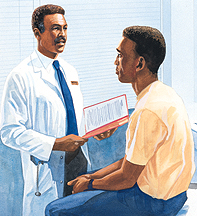Syphilis
People don't talk as much about syphilis today as they did in the past. But people still become infected with syphilis, and it can cause very serious problems.
The sexually transmitted disease syphilis is a bacterial infection. Left untreated, it can cause heart and brain damage, even death. Pregnant women can infect their unborn babies, leading to deformities or even death.
Symptoms
Syphilis progresses in stages. The signs and symptoms in each stage may be so mild that you do not notice them. During the first stage, there is often a painless sore on the sex organs, anus, or mouth. The sore goes away in 1 to 5 weeks. During the next stage, you may develop a rash or flu-like symptoms. These also go away. But the infection is still there. You may have no other signs until serious problems develop.

If treated early, syphilis can be cured with the right medication.
Treatment
Syphilis is treated with antibiotics. During treatment, it is important not to have sex, or you may infect someone else. And be sure to return for follow-up visits. Your partner should also be checked for the disease.
Prevention
As with all STDs, knowing your partner's sexual history is a big step toward preventing syphilis. Know the signs and symptoms of the infection. And use latex condoms to reduce your risk.
Symptoms of Syphilis Stages
Stage 1: A painless sore on the mouth or sex organs
Stage 2: A rash, fever, sore throat, and other flu-like symptoms
Stage 3: Severe disease, or death







